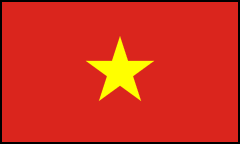For newly arrived accountants in Vietnam, local rules can be both familiar and a little disconcerting at first. Vietnam accountants use Vietnam Accounting Standards (VAS), which is relatively similar to IFRS, with many peculiarities. Assets accounts are part of these peculiarities in Vietnam.
Viettonkin Audit accompanies business with their accounting, in full compliance with Vietnamese regulations. In this article, we introduce you to the first accounts group in the balance sheet - Assets accounts.
This article is the first of series on Vietnam accounting. Subscribe to our newsletter to keep up to date with VAS requirements!
Assets accounts in Vietnam
There are two types in this group named Short-term Assets and Long-term Assets.
Short-term Assets
| Code |
Description |
| 111 |
Cash on hand |
| 112 |
Cash in banks |
| 113 |
Cash in transit |
| 121 |
Trading securities |
| 128 |
Held to maturity investment |
| 131 |
Trade receivables |
| 133 |
Deductible VAT |
| 136 |
Intra-company receivable |
| 138 |
Other receivables |
| 141 |
Advances |
| 151 |
Goods to transit |
| 152 |
Raw materials |
| 153 |
Tools and supplies |
| 154 |
Work in progress |
| 155 |
Finished goods |
| 156 |
Merchandise inventories |
| 157 |
Outward goods on consignment |
| 158 |
Goods in bonded warehouse |
| 161 |
Non-business expenditure out of funds received from the State |
| 171 |
Government bonds purchased for resale |
Long-term Assets
| Code |
Description |
| 211 |
Tangible fixed assets |
| 212 |
Finance lease fixed assets |
| 213 |
Intangible fixed assets |
| 214 |
Depreciation of fixed assets |
| 217 |
Investment properties |
| 221 |
Investment in subsidiaries |
| 222 |
Investment in joint ventures and associates |
| 228 |
Other investment |
| 229 |
Allowance for impairment of assets (credit balance) |
| 241 |
Construction in progress |
| 242 |
Prepaid expenses |
| 243 |
Deferred tax assets |
| 244 |
Mortgage, collaterals and deposits |
For more details, the chart of accounts made by KPMG is a great resource for comprehensive information on Vietnamese accounting.
Steps to review your Assets Accounts
Step 1: Check the Cash On Hand account (Code 111)
- Check your cash details book and make sure this account is not negative at any time.
- The ending balance checking must match the cash inventory record on December 31.
Step 2: Check the Cash In Bank account (Code 112)
- Get sub-books of all bank accounts that the company has opened.
- Reconcile the derived amount and the balance at each time between the bank sub-book and account details book of account 112 and make sure they match.
For foreign currency monetary accounts, conduct revaluation of monetary items denominated in foreign currencies.
- If interests arise from exchange rates, record: Debit of accounts 1122 (Foreign currencies), Credit in Account 4131 (Difference of exchange rate).
- If losses arise from exchange rates, record: Debit in Account 4131, Credit in Account 1122.
- Closing entry the interests from exchange rate in the revaluation at the end of the fiscal year into revenue from financial activities, record: Debit in Account 4131, Credit in Account 515 (Turnover from financial activities).
- Closing entry the losses from exchange rate in the revaluation at the end of the fiscal year into financial expenses from financial activities, record: Debit in Account 635 (Financial expenses), Credit 4131.
Step 3: Check the Trade Securities account (Code 121)
- At the end of the year, check the bonds and stocks and the balance of the company’s securities depository and make sure they match.
- Proceeding with the provision for securities investments. Revaluation of these investments at market prices at 31 December.
- Closing entry: Debit in Account 635, Credit in Account 2291.
Step 4: Check the Held To Maturity Investment (Code 128)
- Conduct the reconciliation of the company's loan with other entities.
- Make a calculation of loan interest by period and issue VAT invoices (without tax rate).
- Financial income recognition.
- Closing entry: Debit in Accounts 131,138,111,112, Credit in Account 515.
Step 5: Check the Trade Receivable account (Code 131)
- Conduct the reconciliation of debts with customers and company. Ensure that debts between the two parties match.
- Take a note for the case of customers having liabilities on the Balance sheet: Accounting for lack of revenue, if customers deposited, advance should be clearly shown in the contract, record of debt reconciliation.
- Provisions for the provision of doubtful debts as prescribed (if any).
- Closing entry: Debit in Account 642, Credit in Account 2293.
Step 6: Check the Deductible VAT account (Code 133)
This account only has the balance in the Debit, reflecting the deductible input tax amount refundable but the State budget has not yet returned it.
At the end of each declaration period (month, quarter), the accountant shall determine the input VAT amount to be deducted from the output VAT amount when determining the payable VAT amount in the period, and record: Debit in Account 3331 (Payable VAT), Credit 133 (Deductible VAT).
The balance of Account 133 (if any) on December 31 must match with the target 41 "VAT not yet deducted at the end of this period" on declaration form 01 / GTGT in December or Q4.
Step 7: Check the Advances account (Code 141)
- Conduct the reconciliation of advances for employees and ensure that the balance between the two parties match.
- Set up the advanced reserves in case employees have quit their jobs and cannot claim them.
Step 8: Check the Tools and Supplies account (Code 153)
- Inventory the actual number of tools and instruments against the books and make sure they match.
- Check the distribution of tools and instruments with the numbers recorded on the accounting books.
Step 9: Check the Inventory accounts (Code 151, 152, 154, 155, 156, 157)
This account just has the balance in Debit, reflecting the actual value of ending inventory.
- Make a list of the actual amount of inventory and make sure they match the numbers on the books.
- Check to see if the inventory is priced correctly (Commonly applicable method is a weighted average).
- Make provisions for devaluation of inventory in case there is a decrease in net realizable value compared to the cost of inventories.
- Closing entry: Debit in Account 632, Credit 2294.
Step 10: Check the Fix Assets and the Depreciation of Fixed Assets accounts (Code 211, 213, 214)
- Make a spreadsheet of fixed assets depreciation, fixed asset cards (fixed asset cards need accompanying documents: Sale and purchase contracts, documents on acceptance and handover, value added invoices and payment receipts);
- Compare the fixed asset depreciation spreadsheet with the arising amounts and balances of Accounts 211, 213 and 214.
Step 11: Check the Prepaid Expenses account (Code 242):
- Make a table of allocation of prepaid expenses.
- Compare the figures in this table with the derived amount and the balance of Accounts 242 and 153.
Want to know more about assets accounts peculiarities in Vietnam? Contact our experts at Viettonkin Accounting.
 English
English








